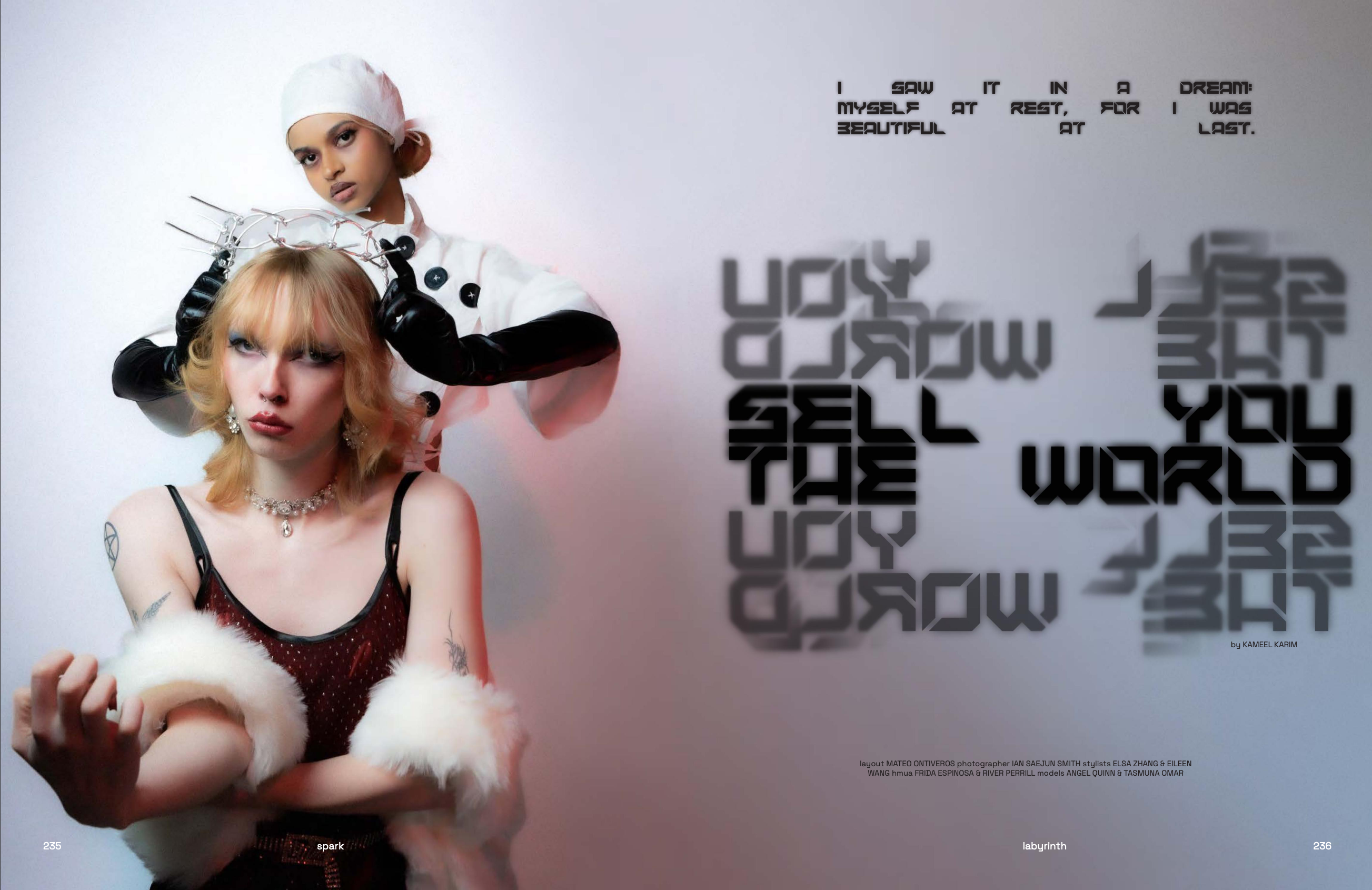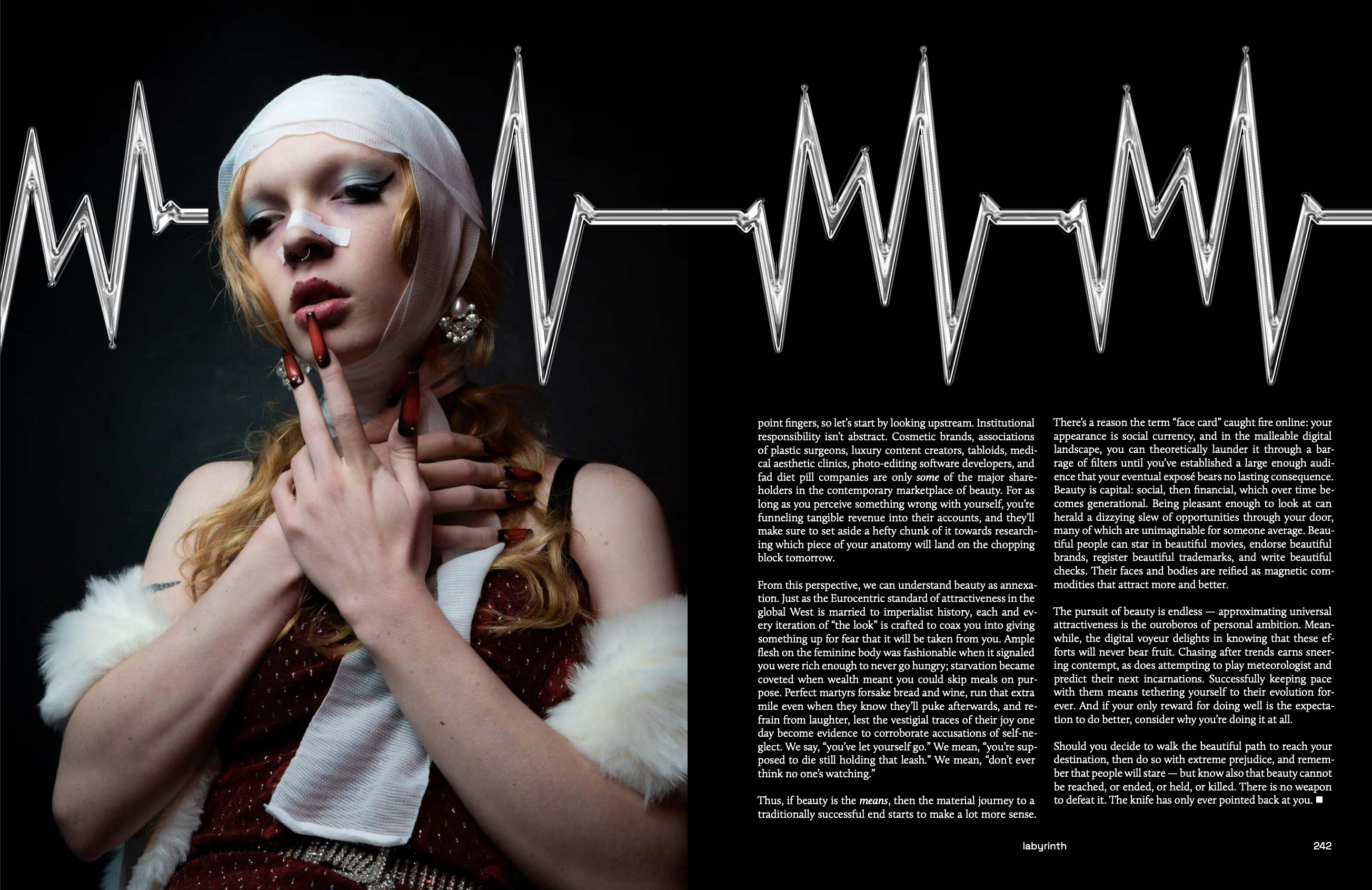sell you the world

| I saw it in a dream: myself at rest, for I was beautiful at last. |
If beauty is the end, then the knife is the means — and I’ll give you a spoiler up front. There is no end, not really.
What does exist in the pursuit of beauty is an insatiable cycle of fixing a perceived imperfection, then finding a new one, and eventually trying to fix that one, too. For some, it’s a process akin to character customization: you remake your self-concept again and again in search of something true. For others, it’s a process of detoxification: eliminating impurities from the body one by one. But while the gap between the actual self and the ideal self is infinite, the flesh is not. A body can only take so much.
In the global West, concepts of desirability are seeded in binary gender norms and the white racial frame, distributed along the axis of wealth. Ethnocentric features are marketed to wealthy buyers but rebuked when they occur naturally on the nonwhite working class. As soon as a procedure becomes widely attainable, the goalpost is shifted. By the time the average Jane is getting anesthetized for a BBL, the models on her Pinterest boards have reverted to Y2K thinspo. And the A-list celebrities those models are imitating? They’re covertly buying out the ozempic injections that Jane’s diabetic mother can only afford through Medicaid in order to drop their belly fat overnight.

So sickness becomes beauty becomes sickness. Smoking clove cigarettes is topical, as is vaping, but Marlboros are for trailer trash. Cocaine is Cancún, but meth is just Mesa, AZ. Lipo ferries the same few ounces of fat through different checkpoints on your body until septic shock rudely intercepts the delivery. If the idea repulses you, pop an Ativan and sleep it off. With any luck, you’ll wake up in the phase of the cycle where your diagnoses are back in fashion. Chasing a standard that’s always subject to revision will catalyze your transformation into someone you don’t recognize — except maybe if you scroll a couple years down on your plastic surgeon’s Instagram feed, and that’s only if they haven’t gone private due to allegations of malpractice.
And then, when the fillers inevitably migrate — when voluptuous cheekbones have dripped into jowl territory and your left breast implant is rock hard — when you’re in the consultation room salivating over a look that expired yesterday, not that you would know — there’s a label for that, too. Those exiled to the land of Botched effectively become living museum exhibits of trends past, and forgiveness is dispensed only to those who manage to claw their way into the adjacent tier known as Camp. (Visas to this particular region are subject to arbitrary revocation.)
The cultural thermometer for cosmetic surgery, body modification, and personal luxury is reaching a boiling point. Invasive procedures are more accessible than ever, and physical attributes float in and out of vogue through a rotating door. If you post publicly online in any capacity, every granular detail of your lifestyle is put on trial, from the order in which you layer your skincare to your consumption of single-use plastics. Your home must be luxe, as well as your newborn children, and your leisure, and your lethargy, and your sadness. There’s not much reprieve offline, either, unless everyone you know mutually agrees to form a commune and commit to subsistence agriculture. The medicalization of aesthetics may not be omnipotent, but it’s certainly omnipresent. Short of cutting contact with urban society in general, the insidious pressure to concede to desirability will haunt you without respite.
This is around the time we get a little desperate to point fingers, so let’s start by looking upstream. Institutional responsibility isn’t abstract. Cosmetic brands, associations of plastic surgeons, luxury content creators, tabloids, medical aesthetic clinics, photo-editing software developers, and fad diet pill companies are only some of the major shareholders in the contemporary marketplace of beauty. For as long as you perceive something wrong with yourself, you’re funneling tangible revenue into their accounts, and they’ll make sure to set aside a hefty chunk of it towards researching which piece of your anatomy will land on the chopping block tomorrow.

From this perspective, we can understand beauty as annexation. Just as the Eurocentric standard of attractiveness in the global West is married to imperialist history, each and every iteration of “the look” is crafted to coax you into giving something up for fear that it will be taken from you. Ample flesh on the feminine body was fashionable when it signaled you were rich enough to never go hungry; starvation became coveted when wealth meant you could skip meals on purpose. Perfect martyrs forsake bread and wine, run that extra mile even when they know they’ll puke afterwards, and refrain from laughter, lest the vestigial traces of their joy one day become evidence to corroborate accusations of self-neglect. We say, “you’ve let yourself go.” We mean, “you’re supposed to die still holding that leash.” We mean, “don’t ever think no one’s watching.”
Thus, if beauty is the means, then the material journey to a traditionally successful end starts to make a lot more sense. There’s a reason the term “face card” caught fire online: your appearance is social currency, and in the malleable digital landscape, you can theoretically launder it through a barrage of filters until you’ve established a large enough audience that your eventual exposé bears no lasting consequence. Beauty is capital: social, then financial, which over time becomes generational. Being pleasant enough to look at can herald a dizzying slew of opportunities through your door, many of which are unimaginable for someone average. Beautiful people can star in beautiful movies, endorse beautiful brands, register beautiful trademarks, and write beautiful checks. Their faces and bodies are reified as magnetic commodities that attract more and better.

The pursuit of beauty is endless — approximating universal attractiveness is the ouroboros of personal ambition. Meanwhile, the digital voyeur delights in knowing that these efforts will never bear fruit. Chasing after trends earns sneering contempt, as does attempting to play meteorologist and predict their next incarnations. Successfully keeping pace with them means tethering yourself to their evolution forever. And if your only reward for doing well is the expectation to do better, consider why you’re doing it at all.
Should you decide to walk the beautiful path to reach your destination, then do so with extreme prejudice, and remember that people will stare — but know also that beauty cannot be reached, or ended, or held, or killed. There is no weapon to defeat it. The knife has only ever pointed back at you. ■
Layout: Mateo Ontiveros
Photographer: Ian Saejun Smith
HMUA: Frida Espinosa & River Perrill
Stylists: Elsa Zhang & Eileen Wang
Models: Angel Quinn & Tasmuna Omar
Other Stories in Labyrinth
© 2025 SPARK. All Rights Reserved.
